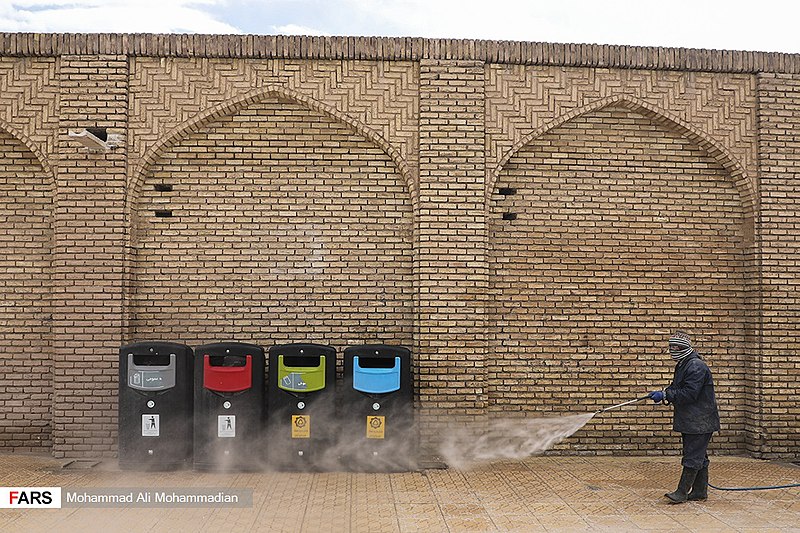
Image by Mohammad Ali Mohammadian
In response to the outbreak of coronavirus, all countries have taken mid and long-term strategic measures to maintain the health and livelihood of their community. Actions were taken based on their assessment of changes in economic structures and social relations as the pandemic spread. But the situation in Iran is different.
The ruling Mullahs and the Iranian government have gone through the experience of anti-government uprisings in November 2019 and February 2020, strategic blows such as the death of Qassem Soleimani, the downing of a Ukrainian plane, along with severely weakened proxy forces. The mullahs clearly feel the prospect of economic disintegration and subsequent popular uprisings in Iran. They are well aware that in order to solve this problem, the budgets of the IRGC and its proxy forces must be cut off, and IRGC’s co-operative warehouses must be opened. The Imam’s Executive Headquarters Fund, which has $ 100 billion in reserve, must pay the price. But this is a red line for the supreme leader because to do so will mean denying its “raison d’être” and base. They also have the experience of the 8-year war with Iraq in the 1980s, during which regime sent 470,000 teenage and child students to the minefields by giving a fabricated white key to heaven in order to open the path for its tanks. And now Tehran is using all those experiences and tactics to maintain its grip on power, by taking the people out of the home quarantine and sending them to be massacred by exposing them to coronavirus so that it does not lead to fall of their regime.
Rouhani has presented a plan to reopen some activities and businesses in the next two weeks. Meanwhile, several regime lawmakers stressed the need to intensify social distancing and even announced an emergency bill to suspend all activities for a month. But the parliament’s emergency bill was rejected by pressure from high-ranking officials, paving the way for Khamenei’s and Rouhani’s plan. Government spokesman Rabiee defended the plan: “Currently, about 3.3 million of official employees are directly exposed to damages. More than 1.5 million of official and unofficial workshops were shut down. 4 million of contractual workers in the country are at risk of cessation or reduction of activity, wage reduction and dismissal. More than 12 million workers are employed in the service sector, and the initial effects of unemployment are evident in 10 sectors that were immediately shut down due to the outbreak of the disease.”
Iraj Haririchi, Iran’s Deputy Minister of Health, pointing to increased traffic in Tehran said: “Tehran could be the Achilles’ heel of Coronavirus control in Iran and could spread the disease to other parts of the province and country. “26.5 percent of coronavirus transmission is through public transport,” he said, adding that “necessary measures must be taken to reduce unnecessary traffic.”
As a result, there is sharp disagreement among regime officials; in fact, Rouhani is in confrontation with health experts and members of parliament who insisted on closing businesses and continuing to home quarantine people. Rouhani and Khamenei do not mention the danger of civil unrest and choose to run the country’s economy and business over public health. Their top priority is the survival of the Islamic Republic.
Rouhani says he is in contact with Khamenei by letter and that Khamenei supports his plans.
According to news reports, during a meeting in Saad Abad Palace last week Rouhani explained the country’s situation and provided justification for his actions. During the meeting, which was attended by senior members of the Revolutionary Guards, the army, security-economic institutions and the Minister of Health, Rouhani stressed the importance of sustaining economic security in the face of the coronavirus outbreak and examined the security-economic implications. He said, “If we close businesses and guilds, after some time we will face 30 million hungry people protesting on the streets” he added, “If this crisis happens, we will not be able to control it”. He clearly mentioned this crossroads of the Iranian people’s destiny,. Even if many people die, the government can not shot down the country. He added: “Government can not follow models like China’s”.
The World Health Organization (WHO) has again warned of the impending spread of this disease if the social distancing is not met. The UN Secretary-General prioritizes the protection of the most vulnerable and the least able to protect themselves. Dr. Tedros Adhanom Ghebreyesus, director-general of WHO, said on Friday, April 10th that any haste in removing COVID-19 restrictions would lead to a “deadly return” of this virus.
Thus, Rouhani and Khamenei, as in the past 41 years, have shown that the lives of human beings are of no value to them and maintaining power the a priority. The founder of this regime, Khomeini, had instructed them that “in order to maintain the trust that is in your hands (the system of the Islamic Republic), it is obligatory on you to spy, lie and do forbidden things.”
As a result, the fundamental question regarding the prospect of Iran’s future is whether we will soon see a general outburst of anger and popular uprising that no force will be able to control and suppress.
- Crypto Traders Warn Big Bitcoin Price Plunge Is Around The Corner After Stagnancy
- With Russia Having China As A Friend, Who Needs Enemies?


1 comment
I believe the mullahs may be frightened of locking down the country. If the people are locked down they might see this as an attempt at greater control over their lives. Secondly, if people are locked down they have more time on their hands and may actually begin thinking for themselves, realizing just how oppressive their government is, and start considering solutions to this problem. Aw, poor mullahs.